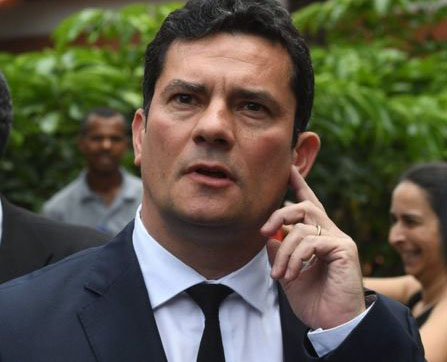SAO PAULO, (Reuters) – Brazil’s Justice Minister Sergio Moro faced intense pressure yesterday after leaked personal messages raised doubts about his impartiality as the judge overseeing landmark corruption cases, with an influential newspaper calling on him to resign.
Moro will appear before the Senate judiciary committee next week to explain the leaked messages, which were published on Sunday by The Intercept news website.
The report said the messages raised serious questions about Moro’s ethics as the judge who imprisoned former president Luiz Inacio Lula da Silva on corruption charges in 2017. They include exchanges between Moro and the lead prosecutor in that case that showed Moro making suggestions about the focus, pace and sequence of investigators’ work.
Moro and the prosecutors have said that nothing released from the hack of their exchanges on the Telegram encrypted chat app indicates any wrongdoing on their part.
Leftist Lula was barred from running for the presidency last year because of Moro’s conviction. Far-right President Jair Bolsonaro prevailed – and promptly named Moro as his justice minister.
The pressure on Moro and federal prosecutors is expected to increase.
The Intercept said it had received an “enormous trove” of hacked data from the mobile phones of Moro and prosecutors overseeing the “Car Wash” corruption probe. It said it had only examined a tiny fraction of the material it has in hand and has promised to publish more articles soon.
The website was co-founded by Glenn Greenwald, a U.S. journalist who made headlines around the world with stories in 2013 and 2014 on U.S. electronic spying, based on classified information leaked by Edward Snowden.
An editorial in the Estado de S.Paulo, the most conservative of Brazil’s three largest newspapers, argued that Moro clearly needs to step down from his post.
The leaked messages were “inappropriate and possibly illegal,” the paper wrote.
“It would be best if the minister resigned and the prosecutors removed from the (Car Wash) task force until everything is cleared up,” the editorial stated.
Supreme Court Justice Gilmar Mendes, who has sharply criticized Moro’s aggressive methods when he was a judge, yesterday told reporters that the messages could potentially being used against him in future criminal charges, arguing that despite the hack being illegal, the evidence it revealed was still valid.
Another top court justice, Marco Aurelio Mello, said if Moro had worked with prosecutors in the way that the leaked messages indicated, he would have clearly broken the basic ethical standards of an impartial judge.
“We are all against corruption, but not the fighting of it at any cost,” Mello said. “That would be a setback for the democratic rule of law.”
Brazil’s Supreme Court on Tuesday indicated it would soon take up an appeal from Lula’s lawyers for him to be freed from prison, but have not yet settled on a date.
Moro’s conviction of Lula was the highest-profile verdict in the ongoing Car Wash probe, which has led to the imprisonment of scores of politicians and businessman in Brazil and elsewhere in Latin America.
The legal team for Lula, who faces at least six other trials on corruption charges, said the leaked messages proved what they have argued in court: that Moro and federal prosecutors teamed up to ensure that their client would be quickly found guilty and blocked from last year’s election.

